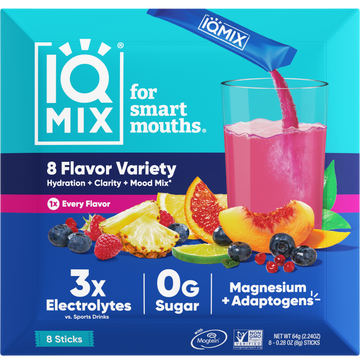In the quest for a healthier lifestyle, many of us are on the lookout for ways to reduce our sugar intake. One way to achieve this is by swapping sugar for noncaloric sugar substitutes, such as erythritol. These sweeteners have gained popularity as a means to sweeten beverages and foods without adding extra calories or affecting blood sugar levels.
Sounds great, right? Well, not so fast. A study recently came out linking erythritol sweetener to higher risks of major heart events.[*] This has left many people feeling wary about using this keto-friendly sweetener.
So, what’s the deal—is this research truly a cause for concern? In this article, we’ll explain why adopting a cautious (not panicked) stance is appropriate. We’ll discuss the potential side effects of erythritol and offer our suggestions for alternatives. Let’s begin by acquainting ourselves with erythritol.
What Is Erythritol?
Erythritol is a naturally occurring sugar alcohol found in small amounts in various fruits, vegetables, and fermented foods. It’s also produced within our cells during normal metabolic processes.
Erythritol can be extracted from corn or other plant sources and then purified for commercial use as an artificial sweetener. When used as a sweetener, the concentration of erythritol is typically more than 1,000 times greater than levels found naturally in foods and our bodies.
This noncaloric sweetener has approximately 70% of the sweetness of table sugar (sucrose), but only about 5% of the calories.[*] Additionally, erythritol doesn’t significantly impact blood sugar levels or insulin response. This is because the human body absorbs erythritol, but doesn’t metabolize it like other sugars. Instead, it’s largely excreted unchanged in the urine.[*] This makes it a popular choice for individuals with diabetes and those following a low-carb diet, such as keto or paleo.
The New Erythritol Study: A Cause for Concern?
A recent study published in Nature Medicine has raised concerns about the potential health effects of erythritol consumption.[*] The study, which analyzed the association between erythritol levels in the blood and the risk of major cardiovascular events, had a couple of layers.
First, the researchers followed a large cohort of over 36,000 people over three years. They collected data on erythritol levels in the participants’ blood and tracked the incidence of major cardiovascular events, such as heart attacks, strokes, and cardiac death. The researchers found a statistically significant association between higher erythritol levels in the blood and an increased risk of major cardiovascular events.
To be clear, the first portion of the study merely indicates an association between erythritol consumption and cardiovascular events—and correlation is not causation. So, this part in and of itself isn’t that meaningful.
Here’s where it gets a bit dicey: the researchers then did a study involving eight people. They fed each person 30 grams of erythritol—a fairly realistic dose—and then looked at platelet aggregation. After the 30 grams of erythritol, the levels of erythritol in people’s blood went up 1,000 times (and stayed elevated for days) and platelet aggregation increased. This is concerning because platelet aggregation heightens the risk of blood clots, which can lead to heart attacks or strokes. This could explain the correlation between erythritol and cardiac conditions in the first part of the study.
While this research doesn’t definitively prove that erythritol is harmful, we think the data is strong enough to warrant caution and removal of erythritol from your daily menu for now.
What Does the FDA Say About Erythritol?
The U.S. Food and Drug Administration (FDA) has classified erythritol as Generally Recognized As Safe (GRAS) for use in food and beverages. This classification means that the FDA considers erythritol safe based on the available scientific data and consensus among qualified experts.
However, this designation has not yet taken into consideration the most recent study mentioned above. The new research may prompt a re-evaluation of its safety profile.
Other sugar alcohols, such as xylitol, mannitol, and maltitol, have safety profiles similar to that of erythritol.[*] However, our understanding of these sweeteners is still limited, and more research is needed to fully assess their safety.
Keto-Friendly Alternatives to Consider
So, what can you use to add some sweetness to your food and drinks without the sugar punch? Our top choice is stevia. Stevia is a natural, sugar-free, noncaloric sweetener derived from the leaves of the Stevia rebaudiana plant.
Based on current research, the FDA has granted stevia GRAS status. It also gets a thumbs up from some public advocacy groups. In a 2014 report by the Center for Science in the Public Interest, stevia was listed as one of the safest sugar substitutes.[*]
What’s more, some research shows that stevia may even offer some health benefits. For instance, some studies suggest that stevia is a powerful antioxidant, helping protect the body from harmful free radicals.[*] And a 2013 study found stevia glycoside derivatives exhibited toxicity against leukemia, lung, stomach, and breast cancer cell lines.[*]
While you shouldn’t go crazy with stevia consumption (too much of anything isn’t good for you, even water!), data suggests that it’s safe to use in moderate amounts. That’s why we chose to sweeten IQBAR and IQMIX with small amounts of stevia
IQBARs and IQMIX are excellent choices for those following a keto-friendly, low-sugar diet. IQBARs contain 1-2 grams of sugar and 2-3 net carbs per bar, and IQMIX is sugar-free, with only 3 grams of carbs.
Try IQBAR in delicious flavors like Chocolate Sea Salt, Almond Butter Chip, Wild Blueberry, and Matcha Chai and IQMIX in Peach Mango, Lemon Lime, Blueberry Pomegranate, and Blood Orange.
The Bottom Line on Erythritol Safety
The recent study doesn’t definitively prove that erythritol is harmful—and indulging in a little erythritol-sweetened ice cream here and there likely won’t hurt. But it’s probably wise to mostly steer clear of erythritol until we better understand the potential health effects. Fortunately, there are other safe and natural alternatives, like stevia, which can be enjoyed in moderation.
We’ll continue to provide updates on erythritol and other zero-calorie sweeteners, helping you make well-informed decisions about your wellness and dietary choices.
Written by Katie Koschalk, a health and wellness writer, certified holistic nutritionist, and certified personal trainer based in California.




